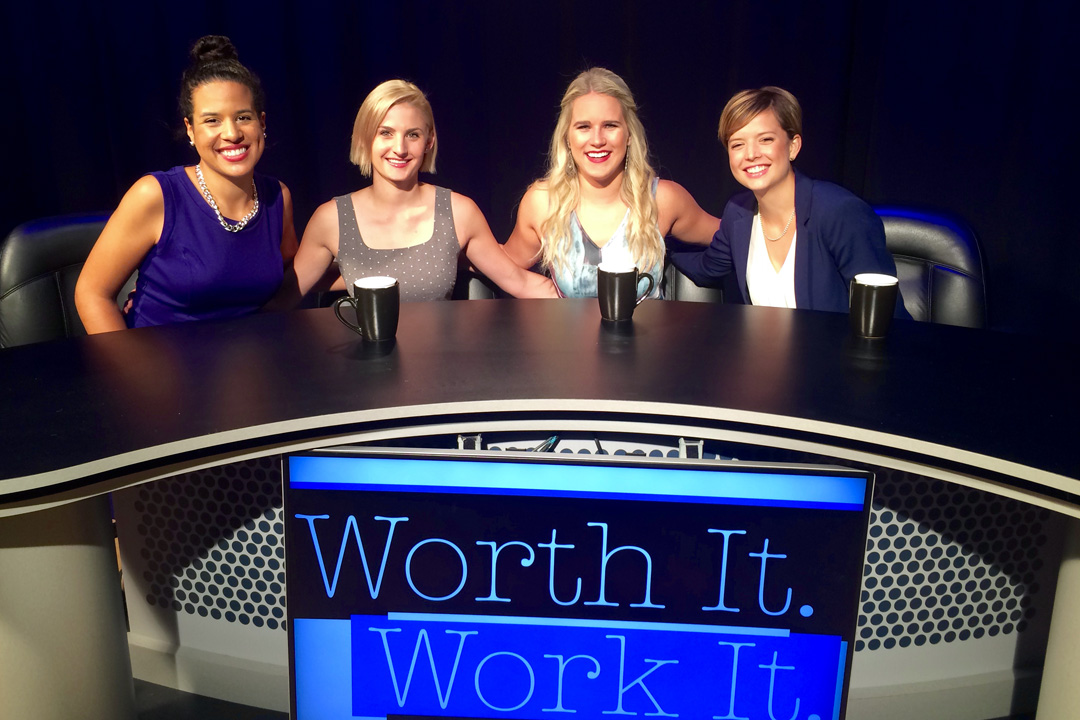I was asked to be a part of “Worth It Work It,” a website dedicated to encouraging women to pursue a career in the media. The founder of the site, Janessa Jackson, a master’s student studying Media & Public Affairs at George Washington, contacted me to speak on a panel focused on Video/TV production. Given my current role at PBS and Women's Media Center, in conjunction with my past experience at BBC, Paramount Pictures, The American Association of University Women, and Feminist Majority Foundation, she thought I would bring a unique perspective to the panel. Thrilled to accept her offer, I shared the stage with three talented, professional women; I was the only student. Each woman brought her own expertise to the discussion, and I centered my platform around the intersection of women, media, and politics and how working for Women’s Media Center, one of the companies who helped produce the film Miss Representation, became my call to action, my ‘aha moment’.
I explained that when I first saw the film I was working at Paramount Pictures on a comedy show, which aired on Nickelodeon at night. The premise of the sitcom was geared to a much younger audience, but what shocked me most was how simply the writers played into stereotypes, specifically female stereotypes, when it came to creating new storylines for each episode. I was disturbed by the fact that adults, both men and women, many with children of their own, did not hesitate to write a character part for the ‘dumb blonde,’ perpetuating the sexism women faced in the media.
I could not help but shift my focus back to Miss Representation, which exposes the sexism and double standards that permeate the media. It not only existed, but I was experiencing it firsthand. Women’s Media Center, a non-profit organization created by Gloria Steinem, Jane Fonda, and Robin Morgan was one of the organizations that helped promote many of the women who participated in the film. These women are part of SheSource Women’s Media Center, an online brain trust of female experts, which can be accessed by the public. The experts are there for career advice, journalistic assistance, and most of all, they are there to show females of all ethnicities that women of all backgrounds are embracing the public space in abundance requiring equality and recognition in all realms. I was hired by Women’s Media Center in the fall of my sophomore year, following my summer at Paramount Pictures as a SheSource intern, and I have continued to work for them ever since. Working with WMC has been a truly incredible experience, and I cannot thank the women in that organization enough for giving me the opportunities they have and still continue to give me. Every year since working with WMC, I have attended the Women’s Media Center Awards in New York, and helping out with projects, research, or even consulting if they need an extra set of hands.
Being asked to share my experiences and background through my panel participation for “Worth It Work It” is an occasion I will always cherish. In my four years at GW, I have acquired diverse work experiences, encountered female mentors eager to share their knowledge, and applied what I have learned in the classroom to the real world. I hope by telling my story I can help empower both girls and women to stand up for what they believe in, follow their passions, and make their mark on the world, especially in the world of political communications and media.


